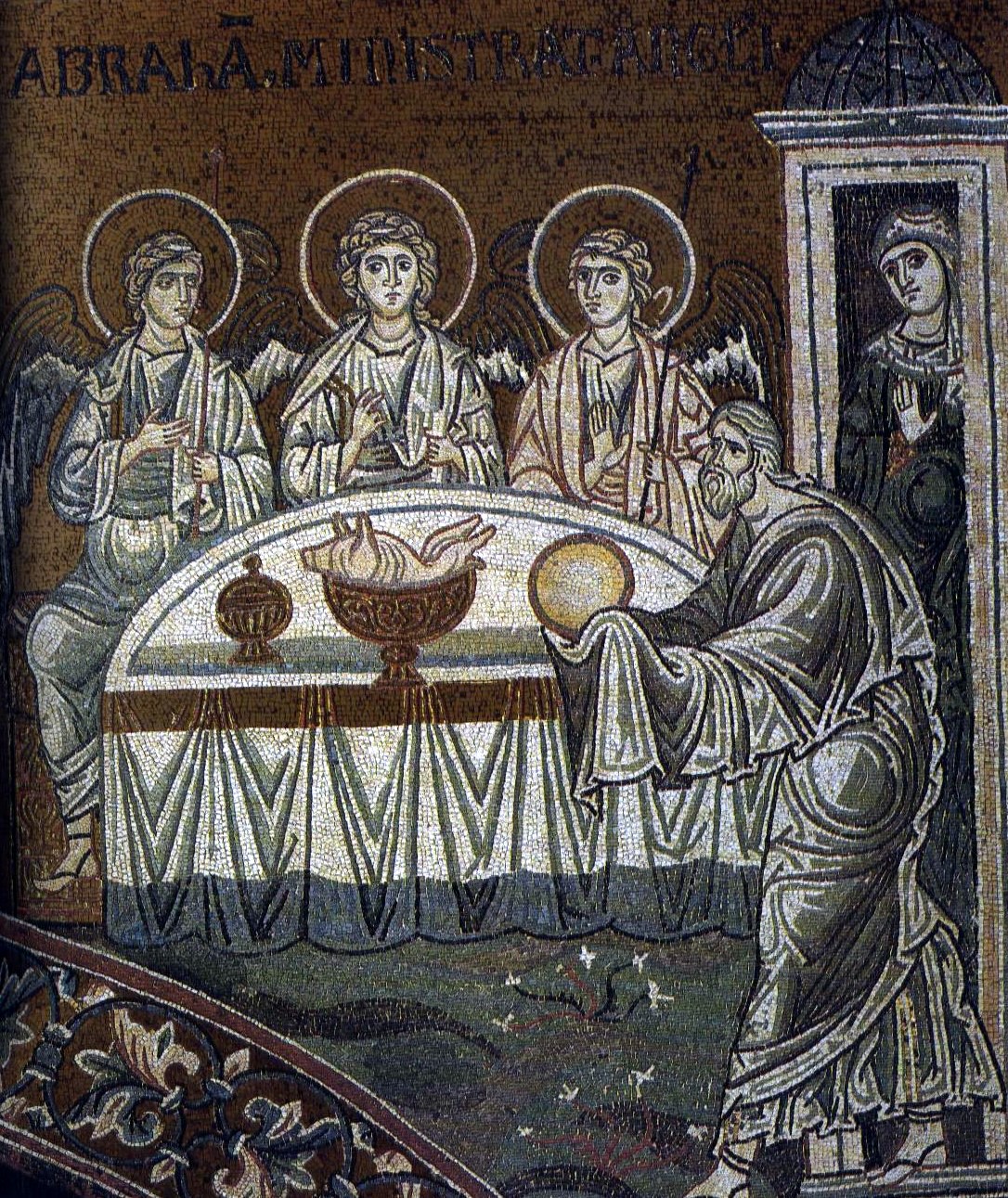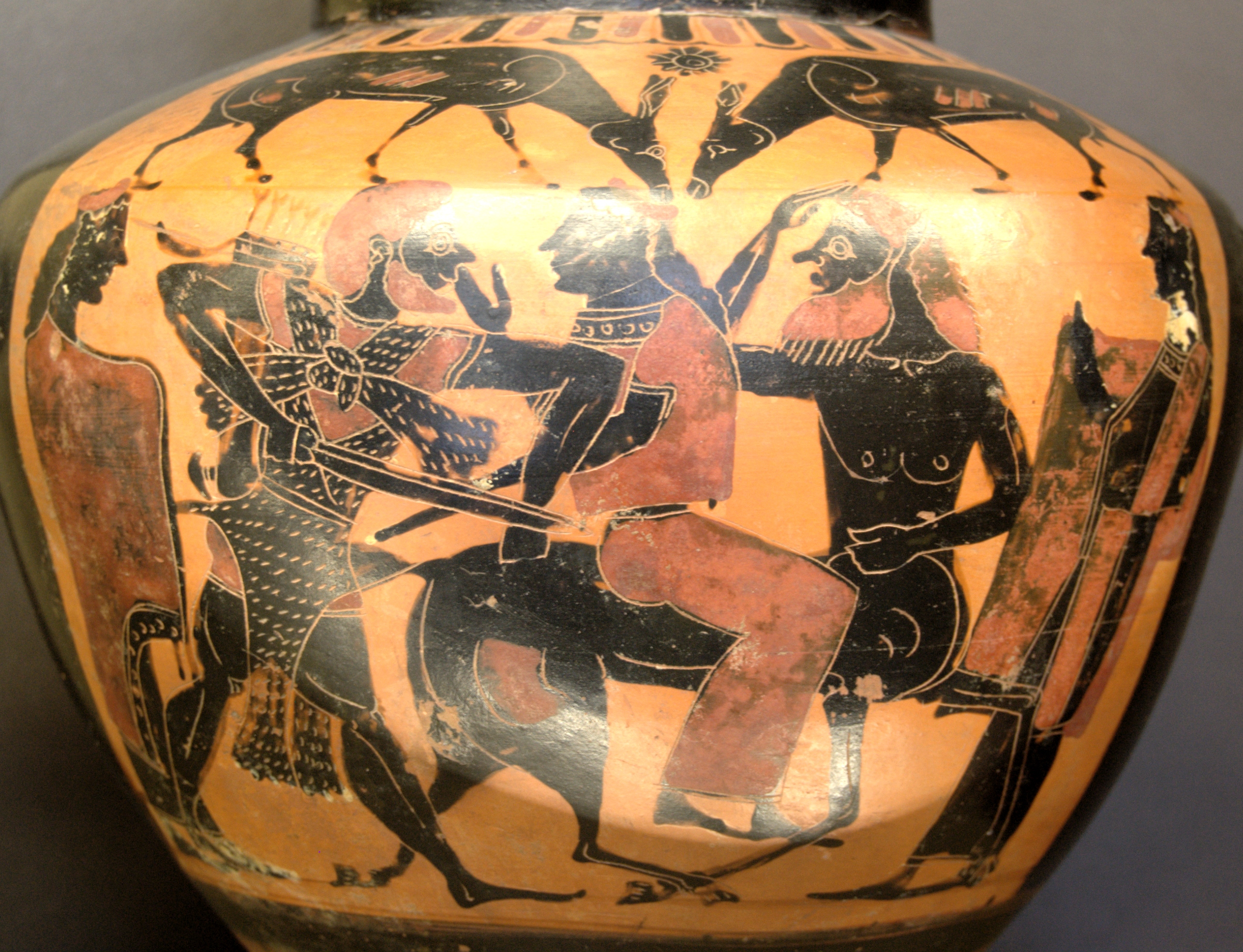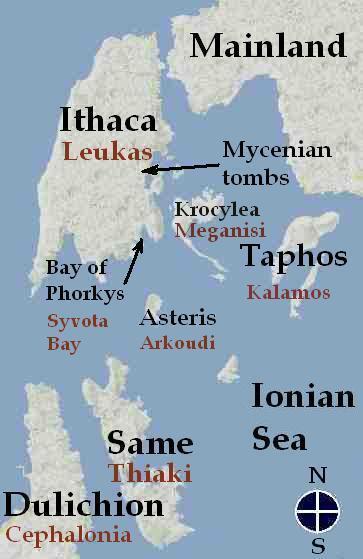|
Ctesippus
:''The name Ctesippus may also refer to a character in Plato's Euthydemus and Lysis, and to a historical figure, see Leptines and Against Leptines.'' In Greek mythology, the name Ctesippus (; Ancient Greek: Κτήσιππος means 'possessing horses') may refer to: *Ctessipus, son of Heracles by Deianira.Apollodorus, 2.7.8 He was the father of Thrasyanor, grandfather of Antimachus and great-grandfather of Deiphontes. Thersander, son of Agamedidas, is also given as his great-grandson. *Ctesippus, another son of Heracles by Astydameia the daughter of Amyntor or Ormenius. *Ctessipus, two of the suitors of Penelope, one from Same, and the other from Ithaca. The rich and "lawless" Ctesippus of Same, son of Polytherses, who has 'fabulous wealth' appears in the ''Odyssey''; he mocks the disguised Odysseus and hurls a bull's hoof at him as a 'gift', mocking xenia, though Odysseus dodges this. Telemachus says if he had hit the guest, he would have run Ctesippus through with his spear ... [...More Info...] [...Related Items...] OR: [Wikipedia] [Google] [Baidu] |
Lysis (dialogue)
''Lysis'' (; grc-gre, Λύσις, genitive case Λύσιδος, showing the stem Λύσιδ-, from which the infrequent translation Lysides), is a dialogue of Plato which discusses the nature of philia (φιλία), often translated as friendship, while the word's original content was of a much larger and more intimate bond.Hoerber, Robert G. “Plato's ‘Lysis.’” Phronesis, vol. 4, no. 1, 1959, pp. 15–28JSTOR/ref> It is generally classified as an early dialogue. The main characters are Socrates, the boys Lysis and Menexenus who are friends, as well as Hippothales, who is in unrequited love with Lysis and therefore, after the initial conversation, hides himself behind the surrounding listeners. Socrates proposes four possible notions regarding the true nature of loving friendship as: # Friendship between people who are similar, interpreted by Socrates as friendship between good men. # Friendship between men who are dissimilar. # Friendship between men who are neither good ... [...More Info...] [...Related Items...] OR: [Wikipedia] [Google] [Baidu] |
Amyntor (son Of Ormenus)
In Greek mythology, Amyntor (Ancient Greek: Ἀμύντωρ, translit. ''Amýntor'', lit. 'defender') was the son of Ormenus, and a king of Eleon or Ormenium. Amyntor's son Phoenix, on his mother's urgings, had sex with his father's concubine, Clytia or Phthia. Amyntor, discovering this, called upon the Erinyes to curse him with childlessness. In a later version of the story, Phoenix was falsely accused by Amyntor's mistress and was blinded by his father, but Chiron restored his sight. Amyntor was also the father of a son Crantor, and a daughter Astydamia. When Amyntor lost a war with Achilles' father Peleus, king of Phthia, Amyntor gave Crantor to Peleus as a pledge of peace. Strabo reports a genealogy for Amyntor which made him the grandson of Cercaphus, the son of Aeolus, and the brother of Euaemon, the father of Eurypylus. When Amyntor refused Heracles permission to pass through his kingdom, Heracles killed Amyntor and fathered a son Ctesippus, by Astydamia. During the Troj ... [...More Info...] [...Related Items...] OR: [Wikipedia] [Google] [Baidu] |
Xenia (Greek)
Xenia ( el, ξενία) is an ancient Greek concept of hospitality. It is almost always translated as 'guest-friendship' or 'ritualized friendship'. It is an institutionalized relationship rooted in generosity, gift exchange, and reciprocity. Historically, hospitality towards foreigners and guests (Hellenes not of your polis) was understood as a moral obligation. Hospitality towards foreign Hellenes honored Zeus ''Xenios'' (and Athene ''Xenia'') patrons of foreigners. The rituals of hospitality created and expressed a reciprocal relationship between guest and host expressed in both material benefits (e.g. gifts, protection, shelter) as well as non-material ones (e.g. favors, certain normative rights). The word is derived from '' xenos'' 'stranger'. The Greek god Zeus is sometimes called Zeus Xenios in his role as a protector of strangers. He thus embodied the moral obligation to be hospitable to foreigners and guests. Theoxeny or ''theoxenia'' is a theme in Greek mythology in ... [...More Info...] [...Related Items...] OR: [Wikipedia] [Google] [Baidu] |
Suitors Of Penelope
In Greek mythology, the suitors of Penelope (also known as the Proci) are one of the main subjects of Homer's ''Odyssey''. Role in the ''Odyssey'' In the ''Odyssey'' Homer describes Odysseus' journey home from Troy. Prior to the Trojan War, Odysseus was King of Homer's Ithaca, Ithaca, a Greek island known for its isolation and rugged terrain. When he departs from Ithaca to fight for the Greeks in the war, he leaves behind a newborn child, Telemachus, and his wife, Penelope. Although most surviving Greek soldiers return shortly after the end of the fighting, Odysseus does not return to Ithaca until ten years after the end of the Trojan War. During Odysseus' long absence, unmarried young men start to suspect that Odysseus died in Troy or on the journey home. Under the pretense of courting Penelope, these youths, called "the suitors", take up residence in Odysseus' home and vie for her hand in marriage. Rather than simply rejecting the suitors, Penelope devises a plan to delay their ... [...More Info...] [...Related Items...] OR: [Wikipedia] [Google] [Baidu] |
Against Leptines
"Against Leptines" was a speech given by Demosthenes in which he called for the repeal of a law sponsored by Leptines, which denied anyone a special exemption from paying public charges ('' leitourgiai''). It was probably delivered in the year 355–54 BC. Unusually for Athenian law courts, though Demosthenes wrote the speech for Ctesippus, the son of Chabrias, he probably delivered it himself. It is thus the first speech which Demosthenes delivered in a public case. History This law had been proposed by a man named Leptines, so the speech came to be known as "Against Leptines". Although Dio Chrysostom (31.128-9) says that Demosthenes won the case, his account has been dismissed as inaccurate. West says that "we do not know the verdict". An inscription shows that Ctesippus, son of Chabrias (whose inheritable exemption Demosthenes was arguing to preserve), performed a liturgy that "is unlikely to have been voluntary," and there is no evidence of any grants of exemption after the tri ... [...More Info...] [...Related Items...] OR: [Wikipedia] [Google] [Baidu] |
Heracles
Heracles ( ; grc-gre, Ἡρακλῆς, , glory/fame of Hera), born Alcaeus (, ''Alkaios'') or Alcides (, ''Alkeidēs''), was a divine hero in Greek mythology, the son of Zeus and Alcmene, and the foster son of Amphitryon.By his adoptive descent through Amphitryon, Heracles receives the epithet Alcides, as "of the line of Alcaeus", father of Amphitryon. Amphitryon's own, mortal son was Iphicles. He was a great-grandson and half-brother (as they are both sired by the god Zeus) of Perseus, and similarly a half-brother of Dionysus. He was the greatest of the Greek heroes, the ancestor of royal clans who claimed to be Heracleidae (), and a champion of the Olympian order against chthonic monsters. In Rome and the modern West, he is known as Hercules, with whom the later Roman emperors, in particular Commodus and Maximian, often identified themselves. The Romans adopted the Greek version of his life and works essentially unchanged, but added anecdotal detail of their own, so ... [...More Info...] [...Related Items...] OR: [Wikipedia] [Google] [Baidu] |
Deianira
Deianira, Deïanira, or Deianeira (; Ancient Greek: Δηϊάνειρα, ''Dēiáneira'', or , ''Dēáneira'', ), also known as Dejanira, is a Calydonian princess in Greek mythology whose name translates as "man-destroyer" or "destroyer of her husband". She was the wife of Heracles and, in late Classical accounts, his unwitting murderer, killing him with the poisoned Shirt of Nessus. She is the main character in Sophocles' play ''Women of Trachis''. Family Deianira was the daughter of Althaea and her husband Oeneus (whose name means "wine-man"), the king of Calydon (after the wine-god gave the king the vine to cultivate), and the half-sister of Meleager. Her other siblings were Toxeus, Clymenus, Periphas, Agelaus (or Ageleus), Thyreus (or Phereus or Pheres), Gorge, Eurymede and Melanippe. In some accounts, Deianira was the daughter of King Dexamenus of Olenus and thus, sister to Eurypylus, Theronice and Theraephone. Others called this daughter of Dexamenus as Mnesimach ... [...More Info...] [...Related Items...] OR: [Wikipedia] [Google] [Baidu] |
Same (Ancient Greece)
Same (; el, Σάμη), also Samos (Σάμος) is an Ancient Greek name of a Homeric island in the Ionian Sea, near Ithaca and Cephalonia. In Homer's ''Odyssey'' Same is described as part of Odysseus's kingdom together with Ithaca, Dulichium, and Zacynthus. The ''Iliad'', book II, in the Catalogue of Ships, contains a different list of islands comprising Odysseus's kingdom. Same is included together with Ithaca, Neritum, Krocylea, Aegilips and Zacynthus, indicating that the "Catalogue of Ships" could be a later addition to the ''Iliad''. In Homer's ''Odyssey'', there is an interesting geographical description: From the above passage, Homer's Same is not the Greek island Samos in the Eastern Aegean Sea, Same should be in the Ionian Sea, near Homer's Ithaca and there should be at least one rocky island between the two islands. Also, this rocky island should be located South of Homer's Ithaca where Telemakhos would arrive from South-West Peloponnese. Based on the above inform ... [...More Info...] [...Related Items...] OR: [Wikipedia] [Google] [Baidu] |
Leptines
Leptines ( grc-gre, Λεπτίνης) was an Athenian orator. He is known as the proposer of a law that no Athenian, whether citizen or resident alien (with the sole exception of the descendants of Harmodius and Aristogeiton), should be exempt from the public charges ('' leitourgiai'') for the state festivals. The object was to provide funds for the festivals and public spectacles at a time when both the treasury and the citizens generally were short of money. It was further asserted that many of the recipients of immunity were really unworthy of it. Against this law Demosthenes delivered (354 BC) his well-known speech "Against Leptines" in support of the proposal of Ctesippus that all the cases of immunity should be carefully investigated. Great stress is laid on the reputation for ingratitude and breach of faith which the abolition of immunities would bring upon the state. Besides, the law itself had been passed unconstitutionally, for an existing law confirmed these privileges, ... [...More Info...] [...Related Items...] OR: [Wikipedia] [Google] [Baidu] |
Ormenius (mythology)
In Greek mythology, Ormenius (Ancient Greek: Ὀρμένιος) may refer to various characters: * Ormenius, a warrior in the army of Dionysus during the Indian War. He was killed by Deriades, king of the Indians. * Ormenius, king of Pelasgiotis killed by Heracles. He had a daughter Astydamia, who had a son Ctesippus with Heracles. * Ormenius, one of the Suitors of Penelope who came from Dulichium along with other 56 wooers. He, with the other suitors, was killed by Odysseus with the assistance of Eumaeus, Philoetius, and Telemachus.Apollodorus, Epitome 7.33 Notes References * Apollodorus, ''The Library'' with an English Translation by Sir James George Frazer, F.B.A., F.R.S. in 2 Volumes, Cambridge, MA, Harvard University Press; London, William Heinemann Ltd. 1921. ISBN 0-674-99135-4Online version at the Perseus Digital Library. [...More Info...] [...Related Items...] OR: [Wikipedia] [Google] [Baidu] |
Astydameia
In Greek mythology, Astydamea or Astydamia (; Ancient Greek: Ἀστυδάμεια ''Astudámeia'', derived from ἄστυ ''ástu'', "town", and δαμάω ''damáo'', "to tame") is a name attributed to several individuals: * Astydamea, also known as Hippolyta, daughter of Cretheus and queen of Iolcus as the wife of Acastus. Her husband purified Peleus of the murder of King Eurytion of Phthia. Astydameia fell in love with Peleus but he scorned her. Bitter, she sent a messenger to Antigone, Peleus' wife, to tell her that Peleus was to marry Acastus' daughter, Sterope; Antigone hanged herself. Astydameia then told Acastus that Peleus had tried to rape her. Acastus believed the false accusations and tried to take revenge in Peleus by taking him on a hunting trip and leaving him unprotected as a group of Centaurs attacked. Peleus escaped death with the help of Chiron and Hermes; he pillaged Iolcus and dismembered Astydameia, then marched his army between the rended limbs. * Astydamea, da ... [...More Info...] [...Related Items...] OR: [Wikipedia] [Google] [Baidu] |
Euthydemus (dialogue)
''Euthydemus'' ( el, Εὐθύδημος, ''Euthydemes''), written c. 384 BC, is a dialogue by Plato which satirizes what Plato presents as the logical fallacies of the Sophists. In it, Socrates describes to his friend Crito a visit he and various youths paid to two brothers, Euthydemus and Dionysodorus, both of whom were prominent Sophists and pankrationists from Chios and Thurii. The ''Euthydemus'' contrasts Socratic argumentation and education with the methods of Sophism, to the detriment of the latter. Throughout the dialogue, Euthydemus and Dionysodorus continually attempt to ensnare Socrates with what are presented as deceptive and meaningless arguments, primarily to demonstrate their professed philosophical superiority. As in many of the Socratic dialogues, the two Sophists against whom Socrates argues were indeed real people. Euthydemus was somewhat famous at the time the dialogue was written, and is mentioned several times by both Plato and Aristotle. Likewise, Dionyso ... [...More Info...] [...Related Items...] OR: [Wikipedia] [Google] [Baidu] |

.jpg)


